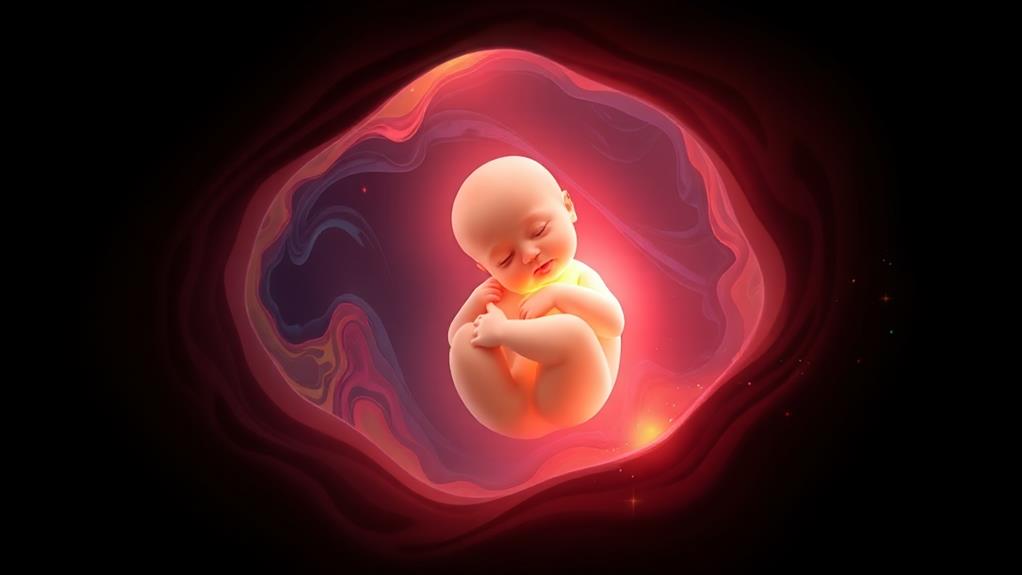You might be surprised to learn how much babies behave in the womb, revealing secrets about their development and personalities long before they make their entrance into the world. From responding to sounds and tastes to exhibiting distinct sleep cycles, these behaviors provide essential insights into their future preferences and relationships. Additionally, the way they react to their environment can be quite telling about their emotional well-being. What you discover next may challenge your perceptions of prenatal development and the profound connections that begin even before birth.
Fetal Movement Patterns
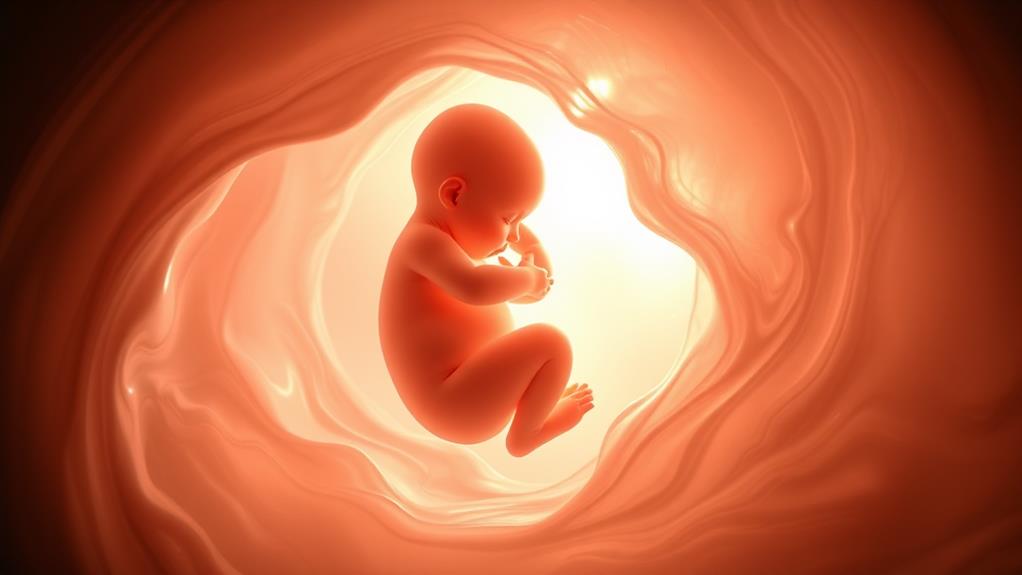
As you near the end of your pregnancy, you might notice that your baby's movements become more pronounced and varied. It's like they're practicing for a dance recital! You'll feel kicks, rolls, and even some surprising jabs. These movements are a sign that your baby is growing stronger and getting ready for the big debut.
You may notice patterns in these movements as well. Some babies are night owls, kicking up a storm when you're trying to sleep. Others might be more active during the day, especially after you eat. Your baby's movements can also change based on your activities. If you're relaxing, they might start doing gymnastics!
Keep track of these movements; they can tell you a lot about your baby's well-being. If you notice a significant decrease in movement, it's always a good idea to reach out to your doctor. They'll want to check everything's okay.
Responses to Sound
Within the cozy confines of the womb, your baby is already tuning in to the world outside. Isn't that amazing? Around the 25th week of pregnancy, your little one starts to hear sounds. They can pick up on your voice, music, and even the rhythm of your heartbeat. It's like they're getting a sneak peek into life before they arrive!
When you talk or sing, your baby may respond by moving or kicking. It's their way of saying, "Hey, I'm listening!" This shows that they not only hear sounds but also recognize familiar voices, especially yours. Some studies suggest that babies can even respond differently to music they've heard while in the womb.
You might notice your baby reacting to loud noises, too. Sudden sounds can make them jump or squirm, just like you might when someone surprises you. It's all part of their early learning experience!
Taste Preferences

How does your baby's taste develop even before birth? Well, believe it or not, your little one starts sampling flavors while still in your belly! As you munch on various foods, those flavors mix with the amniotic fluid. Your baby gulps it down, helping them explore the world of taste. Isn't that amazing?
Research shows that babies can recognize the tastes of foods you consume regularly. If you enjoy spicy salsa, your baby might develop a fondness for zesty flavors. On the other hand, if you stick to sweet fruits, they might lean toward sugary tastes. It's like a sneak peek into their culinary preferences!
This early exposure to different flavors can even influence their eating habits after birth. So, if you want a little foodie that enjoys a variety of foods, consider mixing up your diet while pregnant.
Just think, your baby may end up loving broccoli because they got a taste of it before they were even born! Who knew that what you eat could shape your baby's palate? So, go ahead, enjoy those flavors, and let your baby join the feast!
Sleep Cycles
Your baby's development goes beyond taste; it also includes their sleep patterns. That's right! Even while they're cozied up in your belly, your little one is snoozing away. In fact, research shows that babies in the womb have sleep cycles just like we do. They alternate between active sleep and quiet sleep, which is kinda cool!
During active sleep, you might feel some wiggling or kicking. It's as if your baby's having a little dance party! On the other hand, during quiet sleep, they're like a tiny sloth, relaxing and recharging. These cycles usually last about 20-40 minutes, and your baby might've several of them throughout the day and night.
What's fascinating is that these sleep patterns can even be influenced by your movements. When you're active, your baby might feel rocked to sleep, and when you're resting, they may wake up and start their little gymnastics routine.
Bonding Through Touch

As you touch your belly, your baby might respond by moving or kicking. That's a little nudge back, letting you know they're aware of your affection. You might even find that your baby calms down with your soothing touch. Isn't that incredible?
Some parents find that playing soft music or singing while touching their belly also helps create that bond. It's like a little concert for two!
Reacting to Light
While bonding through touch strengthens your connection, another fascinating aspect of baby behavior in the womb is their reaction to light.
Did you know that your little one can actually sense light even before they're born? It's true! When you shine a light on your belly, your baby might respond by moving away from it or even wiggling around. It's like they're playing a game of peekaboo!
Around 26 weeks, babies start to develop light sensitivity. Their tiny eyes can detect changes in light, although they can't see clearly yet.
If you think about it, it's pretty amazing! Your baby is getting ready for the world, and they're already reacting to things happening outside the womb.
Swallowing Reflex
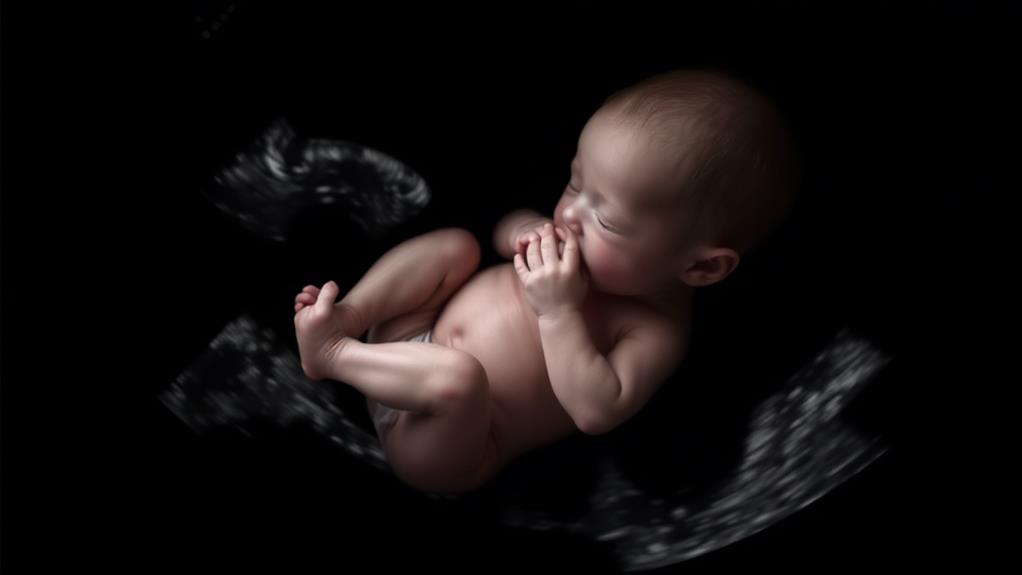
The swallowing reflex is an intriguing development that begins to emerge in the womb around 12 weeks. During this time, your baby starts practicing the significant skill of swallowing amniotic fluid. This isn't just a random activity; it's essential for their growth and development.
As they gulp down this fluid, they're helping their digestive system get ready for life outside the womb. You might wonder why this matters so much. Well, swallowing helps stimulate the baby's organs, especially the stomach and intestines. It's like a little workout!
By practicing this reflex, your baby's body learns how to process food and nutrients once they're born. You may also find it fascinating that this reflex can even be triggered by your movements. When you walk or change positions, it can create waves in the amniotic fluid, encouraging your baby to swallow more.
Hiccuping in the Womb
Hiccuping in the womb is another fascinating aspect of your baby's development. You might be surprised to learn that your little one starts hiccuping as early as the second trimester! These tiny, rhythmic movements can be quite adorable, almost like your baby is practicing their dance moves.
So, what's causing these hiccups? Well, it's all about the diaphragm. As your baby swallows amniotic fluid, the diaphragm contracts, leading to those little hiccups. It's a normal part of their growth and helps develop their lungs. Plus, it's a great way for them to practice breathing!
You might feel these hiccups as gentle thumps or fluttering sensations in your belly. Some parents find it amusing, while others can't help but wonder what their baby is up to in there.
Don't worry; hiccuping is perfectly safe and usually nothing to stress about.
In fact, many parents cherish these moments, finding comfort in the knowledge that their baby is active and healthy. So, the next time you feel those cute little hiccups, just think of it as your baby's way of saying, "Hey, I'm here!"
Yawning Behavior

As your baby develops in the womb, you might notice some intriguing yawning behavior. That's right! Your little one isn't just chilling in there; they're practicing their yawns! Research shows that yawning can start as early as the second trimester. It's like your baby's way of stretching out those tiny facial muscles.
Now, you might wonder why babies yawn in the womb. Scientists believe it's a sign of brain development and a way to regulate oxygen levels. Yawning helps your baby get ready for life outside, where they'll need to take deep breaths and stay alert.
So, when you see those adorable yawns, it's a little reminder of how much they're growing! You might even catch a glimpse of this behavior on an ultrasound. Imagine watching that sweet little face open wide in a yawn!
It's moments like these that make pregnancy feel extra special. Plus, it's a fun way to bond with your baby before they arrive. So, embrace those yawns—they're just one of the many fascinating ways your baby is preparing for the big world ahead! Who knew yawning could be so endearing?
Stretching and Kicking
While you're marveling at your baby's yawning, don't be surprised if you also feel some stretching and kicking going on.
These little movements are a sign that your baby is growing stronger every day. It's like they're practicing for a tiny gymnastics competition! Stretching helps them build those muscles and get comfortable in their cozy home.
You might notice kicks that seem to come out of nowhere, but don't worry, they're just your baby showing off their new skills.
These movements can be gentle nudges or vigorous kicks, depending on their mood. Sometimes, it might feel like your belly's doing a little dance, and trust me, that's perfectly normal!
As your baby gets bigger, you'll likely feel these stretches and kicks more often.
It's a fun reminder that there's a little person inside, ready to greet the world. Just think of it as a sneak peek of their personality!
So, whether it's a soft stretch or a playful kick, enjoy the moment. Your baby's movements aren't just adorable; they're also an essential part of their development.
Keep those kicks coming, little one!
Positioning and Space
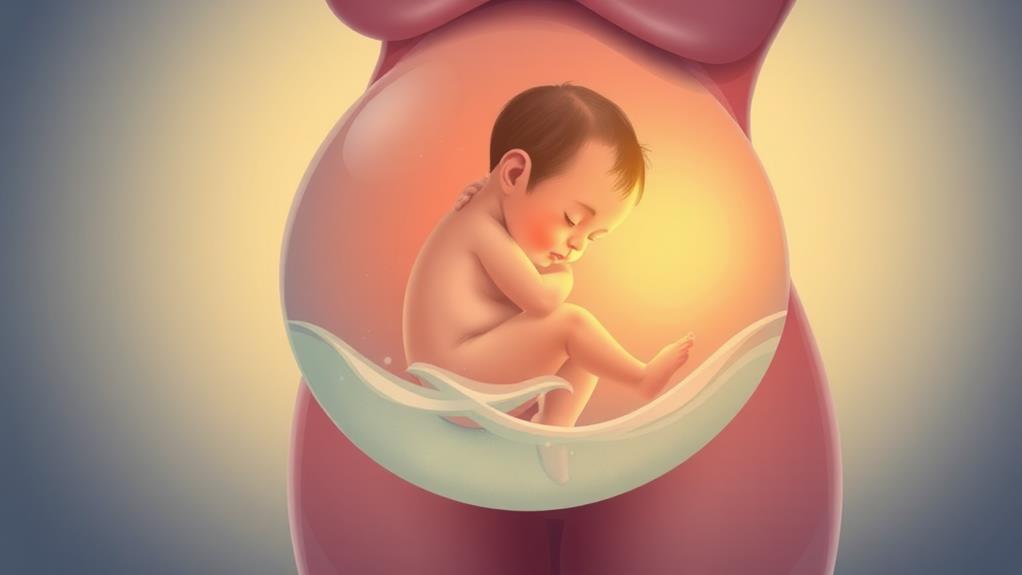
After feeling those delightful stretches and kicks, you might start to wonder about your baby's positioning and how much space they've in the womb. It's like a tiny gymnastics studio in there! Your baby isn't just floating aimlessly; they're moving around, practicing all sorts of skills. As they grow, they might twist, turn, and even flip over.
By the third trimester, space gets a bit tight, and you might notice fewer big movements. That's because your little one's getting cozy, finding their favorite position. Some babies like to hang out head-down, while others might be sideways or even breech.
The amniotic fluid helps cushion your baby, allowing them to explore and stretch, which is super important for their development. You might feel a lot of kicks in the ribs or hiccups low in your belly, depending on how they're positioned.
Don't worry if you don't feel the same movements every day. Babies have their own schedules, and they might be napping or just chilling out.
Keep enjoying those sweet moments, and remember, your little acrobat is busy preparing for the big debut!
Fetal Heart Rate Variations
You might be surprised to learn that your baby's heart rate can vary quite a bit during pregnancy. That's right! Just like you might feel excited or relaxed, your little one can have a rhythm of their own.
Typically, a fetal heart rate ranges from 120 to 160 beats per minute. However, this can change based on their activity level.
When your baby kicks and moves around, their heart rate might speed up, showing they're having a dance party in there. On the flip side, when they're sleeping or resting, their heart rate can slow down. Isn't that fascinating?
Doctors often monitor these heart rate variations during check-ups. They want to make sure everything's on track. If the heart rate is too fast or too slow, it can be a sign that your baby needs a little extra care.
Influence of Maternal Diet

The foods you eat during pregnancy can greatly influence your baby's development in the womb. Imagine your little one munching on the same nutrients you're enjoying! Your diet can shape everything from their brain development to their taste preferences later in life.
If you love colorful fruits and veggies, you're not just treating yourself; you're also giving your baby a rainbow of vitamins and minerals.
Protein is another superstar nutrient. It helps build your baby's muscles and tissues. So, don't skip that chicken, beans, or tofu!
And let's not forget about healthy fats. Foods like avocados and nuts are brain boosters. They help with your baby's growing brain connections, which is a big deal!
Now, you might be wondering about cravings. If you find yourself dreaming of pickles and ice cream, it's okay! Just remember to balance those cravings with nutritious foods.
Eating a variety of healthy options can help make sure your baby gets what they need. So, enjoy your meals, and think of them as a feast for two! After all, good food leads to happy babies—yum!
Stress Responses
Stress during pregnancy can greatly affect your baby's behavior in the womb. When you feel stressed, your body releases hormones like cortisol. These hormones can travel through the placenta and reach your little one.
Imagine your baby feeling those emotions! It's like they're getting a sneak peek into your world.
Research suggests that when you're stressed, your baby might react by moving around more. You might notice more kicks and jabs, almost like your baby is saying, "Hey, what's going on in there?"
It's important to remember that some stress is normal, but too much can lead to more significant challenges.
If you're feeling overwhelmed, try to find ways to relax. Simple things like deep breathing, listening to your favorite music, or even chatting with a friend can help.
Your baby picks up on your feelings, so creating a calm environment can make a big difference. Think of it as setting the mood for a cozy movie night!
The Role of Amniotic Fluid

While managing stress is essential for a healthy pregnancy, another important aspect to contemplate is the role of amniotic fluid. This clear, slightly yellowish liquid surrounds your baby in the womb, creating a cozy little bubble. Think of it as your baby's personal swimming pool!
Amniotic fluid serves several important purposes. First, it cushions your baby, protecting them from bumps and jolts. It also helps regulate temperature, keeping your little one comfy. Plus, the fluid allows your baby to practice swallowing and breathing, which are key skills they'll need after birth.
Believe it or not, the amount of amniotic fluid can also signal how well your baby's doing. If there's too little or too much, your doctor might keep a closer eye on things. So, it's a good idea to pay attention to any changes.
As your pregnancy progresses, the fluid levels will change, but that's totally normal! Just remember, this magical liquid plays a huge role in your baby's development, making their time in the womb as safe and happy as possible.
Brain Development Indicators
Many parents may be surprised to learn that brain development begins long before birth, with key indicators emerging during pregnancy. As your baby grows, their brain is busy making connections and developing skills.
By around 20 weeks, you might notice your little one responding to sounds. That's right! They can hear your voice and even recognize rhythms. How cool is that?
Around 25 weeks, your baby might start showing signs of sleep cycles, which means they're practicing those all-important snoozing skills. You could even feel them moving more during the day and less at night, just like a tiny night owl!
By the third trimester, your baby's brain is developing rapidly. Their brain waves can be measured, showing signs of activity that indicate learning. Yes, learning!
They might be practicing facial expressions, like frowning or smiling, which helps them prepare for life outside the womb.
Emotional Reflection of the Mother
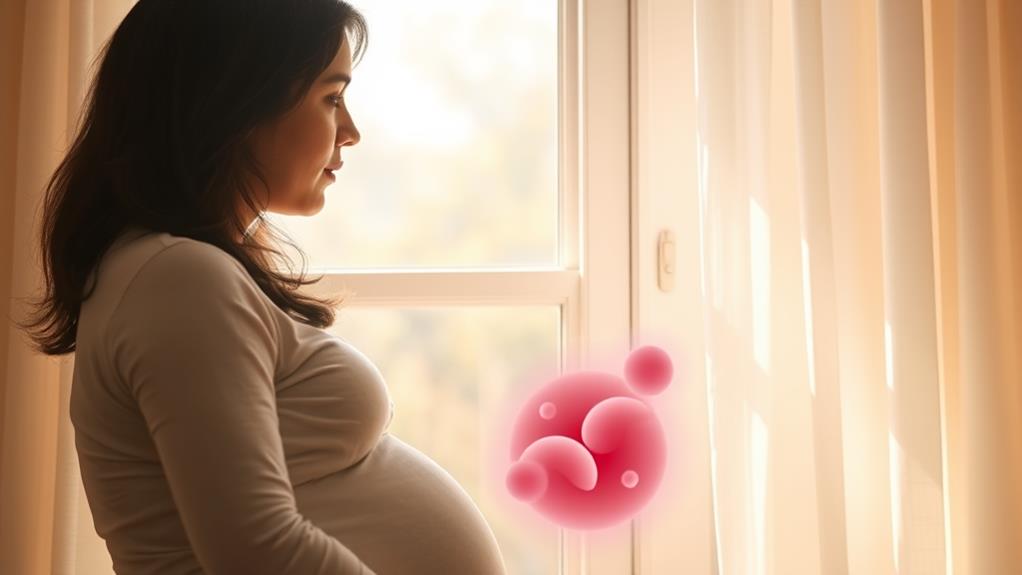
The emotional state of a mother during pregnancy can greatly impact her baby's development. When you're feeling happy, your little one can sense that joy. It's like they're soaking up all those good vibes!
On the flip side, stress or anxiety can create a different atmosphere. Research shows that high stress levels can lead to changes in your baby's brain development, affecting their emotions later on. That's why it's important to take care of yourself.
You might find it helpful to practice relaxation techniques like deep breathing or meditation. Even a walk in the fresh air can boost your mood!
Plus, talking to your baby, singing, or playing music can strengthen that special bond, making them feel safe and loved.

